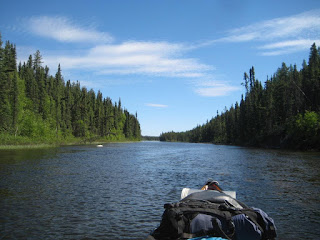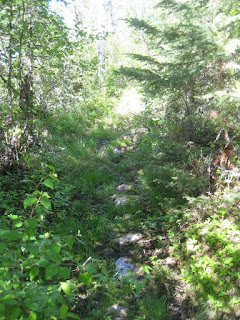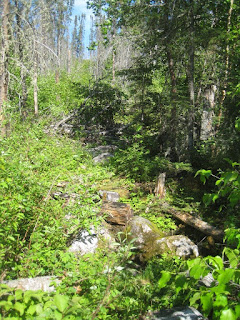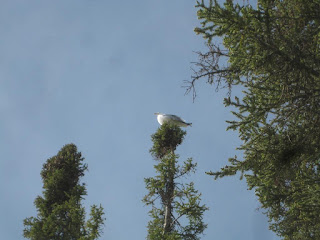When using an established portage, my first load includes the tool kit so I can clear trees if required. Here I easily find the 220 metre trail and it only takes about 30 minutes to clear down trees.
A well established bear trail crossing the portage trail.
This portage trail skirts a rock escarpment between a lake and a river. As usual I am travelling using topographical maps, choosing a route that "looks" like a good way to go between waterways. Here I am lucky to find an established portage, requiring minimal clearing.
Heading upstream, I am able to paddle or pole up shallow rapids so I am glad that I do not have to wade and get wet.
Lunch in the shade on a hot day.
I thought there might be a portage upstream around these rapids but cannot find any sign of an old portage. Luckily I discover an old trail off to the side that leads to a small lake between the river and the big lake emptying into this river. This saves me cutting a new trail through the recently burned bush which would have taken several days work.
The 450 metre trail needs extensive clearing and takes two hours of sweaty work with saw, pruners and axe. The trail goes through thick brush, over and under trees too large for me to saw, through muskeg and across a creek. One fallen tree is too low to carry the canoe under and too high to step over. Oh joy! Clearing one spot of jumbled balsam fir trees requires figuring out the order to untangle and cut, like the game of "pick-up sticks". Blackflies are very bothersome so I wear my hat scarf all day.
After clearing another trail 220 metres to the big lake, I am more than ready to stop for the day, sweaty and weary. As far as the eye can see the big lake had been burned about 10 years prior. If necessary I can camp "anywhere", but am hoping for a good site. At this point I start chanting "Come on campsite, come on campsite, ...". Luckily within one km, I spot a small island that had escaped the fire. I am still chanting, hoping that the isle will provide an adequate campsite ... it does. I do not get to bed until just before midnight, very weary after a long day. Definitely a rest day tomorrow. Wake during the night and both legs cramp up very bad, taking several minutes of rubbing and many aie's to relax. I did not drink enough water, much sweaty work and many carries.
Camp 8, after 13 km with three portages, 220, 450 and 220 metres long.
Several gulls were using tree tops on the island as perches to survey their domain.
The large bare rock shoal is home for two gull nests. Note that one of the eggs is hatching, the chick already having broken open the shell with its egg tooth. Such eggs are good eating, but these are too mature. The best way to identify fresh eggs earlier in the season is to mark the existing eggs with a pencil and then look for unmarked ones afterwards.
This is the waterfall of the lake's exit to the river from which I portaged. It would probably be a good spot for walleye fishing but I cannot find a place from which to cast a line without getting into the water.
I stop at a nearby island for lunch after canoeing to the falls. The small fire is to shoo the bothersome blackflies away and to boil water to drink with my meal. The strong headwind in a near empty canoe makes for a tough time canoeing back to camp, swinging me sideways twice and taking great effort to pull back on course.
On the last day, the very strong wind changes directions so I move my fireplace to the opposite side of the island. I have to cut a 100 metre trail across the island to the new site and move the tarp shelter midway to a protected spot.
On this big lake, I meet four fishermen from Colorado who are staying at a fly-in fishing lodge that I did not realize existed here. They graciously give me several cans of beer and a fish lure. The beer goes down good with supper. The fish lure becomes one of my favourites, until losing it many weeks later when the line breaks.












































